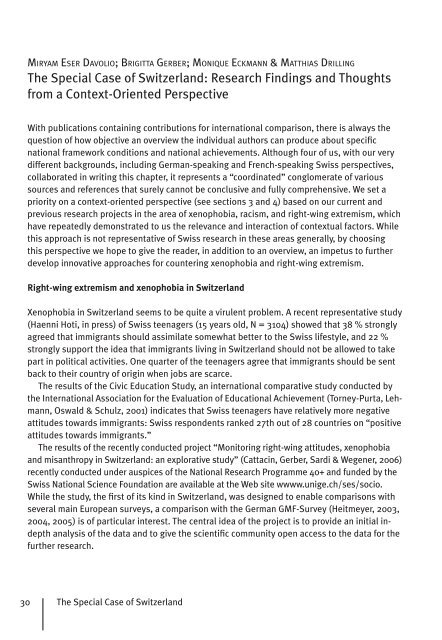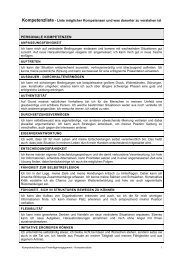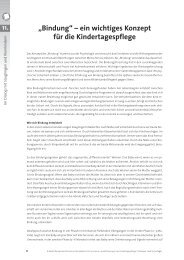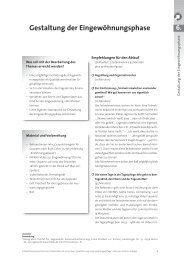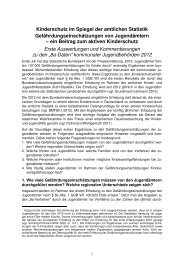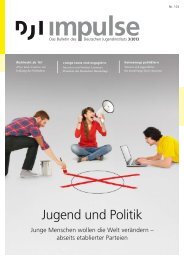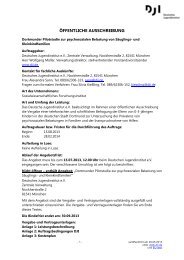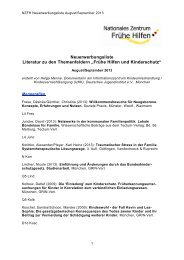Prevention of Right-Wing Extremism, Xenophobia and Racism in ...
Prevention of Right-Wing Extremism, Xenophobia and Racism in ...
Prevention of Right-Wing Extremism, Xenophobia and Racism in ...
You also want an ePaper? Increase the reach of your titles
YUMPU automatically turns print PDFs into web optimized ePapers that Google loves.
MIRYAM ESER DAVOLIO; BRIGITTA GERBER; MONIQUE ECKMANN & MATTHIAS DRILLING<br />
The Special Case <strong>of</strong> Switzerl<strong>and</strong>: Research F<strong>in</strong>d<strong>in</strong>gs <strong>and</strong> Thoughts<br />
from a Context-Oriented Perspective<br />
With publications conta<strong>in</strong><strong>in</strong>g contributions for <strong>in</strong>ternational comparison, there is always the<br />
question <strong>of</strong> how objective an overview the <strong>in</strong>dividual authors can produce about specifi c<br />
na tio nal framework conditions <strong>and</strong> national achievements. Although four <strong>of</strong> us, with our very<br />
dif ferent backgrounds, <strong>in</strong>clud<strong>in</strong>g German-speak<strong>in</strong>g <strong>and</strong> French-speak<strong>in</strong>g Swiss perspectives,<br />
colla borated <strong>in</strong> writ<strong>in</strong>g this chapter, it represents a “coord<strong>in</strong>ated” conglomerate <strong>of</strong> various<br />
sources <strong>and</strong> references that surely cannot be be conclusive <strong>and</strong> fully comprehensive. We set a<br />
priority on a context-oriented perspective (see sections 3 <strong>and</strong> 4) based on our current <strong>and</strong><br />
previous research projects <strong>in</strong> the area <strong>of</strong> xenophobia, racism, <strong>and</strong> right-w<strong>in</strong>g extremism, which<br />
have repeatedly demonstrated to us the relevance <strong>and</strong> <strong>in</strong>teraction <strong>of</strong> contextual factors. While<br />
this approach is not representative <strong>of</strong> Swiss research <strong>in</strong> these areas generally, by choos<strong>in</strong>g<br />
this perspective we hope to give the reader, <strong>in</strong> addition to an overview, an impetus to further<br />
develop <strong>in</strong>novative approaches for counter<strong>in</strong>g xenophobia <strong>and</strong> right-w<strong>in</strong>g extremism.<br />
<strong>Right</strong>-w<strong>in</strong>g extremism <strong>and</strong> xenophobia <strong>in</strong> Switzerl<strong>and</strong><br />
<strong>Xenophobia</strong> <strong>in</strong> Switzerl<strong>and</strong> seems to be quite a virulent problem. A recent representative study<br />
(Haenni Hoti, <strong>in</strong> press) <strong>of</strong> Swiss teenagers (15 years old, N = 3104) showed that 38 % strongly<br />
agreed that immigrants should assimilate somewhat better to the Swiss lifestyle, <strong>and</strong> 22 %<br />
strongly support the idea that immigrants liv<strong>in</strong>g <strong>in</strong> Switzerl<strong>and</strong> should not be allowed to take<br />
part <strong>in</strong> political activities. One quarter <strong>of</strong> the teenagers agree that immigrants should be sent<br />
back to their country <strong>of</strong> orig<strong>in</strong> when jobs are scarce.<br />
The results <strong>of</strong> the Civic Education Study, an <strong>in</strong>ternational comparative study conducted by<br />
the International Association for the Evaluation <strong>of</strong> Educational Achievement (Torney-Purta, Leh-<br />
mann, Oswald & Schulz, 2001) <strong>in</strong>dicates that Swiss teenagers have relatively more negative<br />
attitudes towards immigrants: Swiss respondents ranked 27th out <strong>of</strong> 28 countries on “positive<br />
attitudes towards immigrants.”<br />
The results <strong>of</strong> the the recently conducted project “Monitor<strong>in</strong>g right-w<strong>in</strong>g attitudes, xenophobia<br />
<strong>and</strong> misanthropy <strong>in</strong> Switzerl<strong>and</strong>: an explorative study” (Cattac<strong>in</strong>, Gerber, Sardi & Wegener, 2006)<br />
recently conducted under auspices <strong>of</strong> the National Research Programme 40+ <strong>and</strong> funded by the<br />
Swiss National Science Foundation are available at the Web site wwww.unige.ch/ses/socio.<br />
While the study, the fi rst <strong>of</strong> its k<strong>in</strong>d <strong>in</strong> Switzerl<strong>and</strong>, was designed to enable comparisons with<br />
several ma<strong>in</strong> European surveys, a comparison with the German GMF-Survey (Heitmeyer, 2003,<br />
2004, 2005) is <strong>of</strong> particular <strong>in</strong>terest. The central idea <strong>of</strong> the project is to provide an <strong>in</strong>itial <strong>in</strong><strong>in</strong>- depth analysis <strong>of</strong> the data <strong>and</strong> to give the scientifi c community open access to the data for the<br />
further research.<br />
30 The Special Case <strong>of</strong> Switzerl<strong>and</strong>


